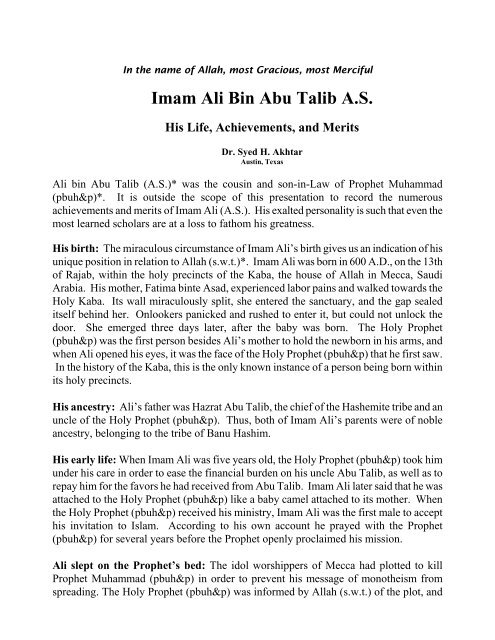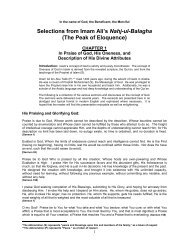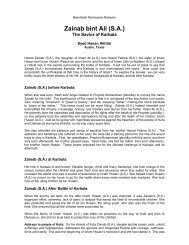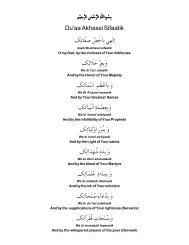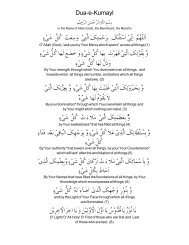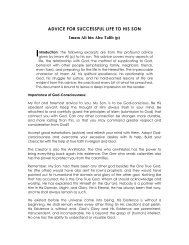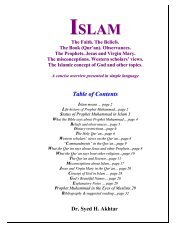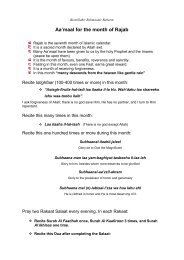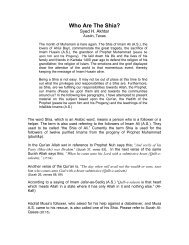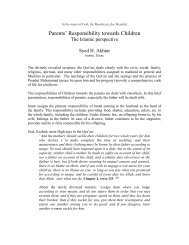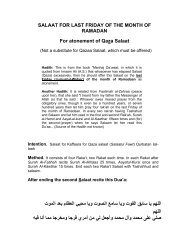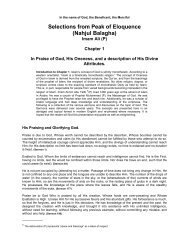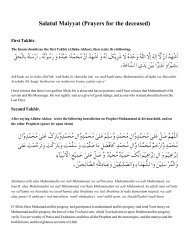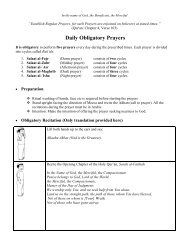Imam Ali bin Abu Talib (A.S), a short biography - Islam
Imam Ali bin Abu Talib (A.S), a short biography - Islam
Imam Ali bin Abu Talib (A.S), a short biography - Islam
You also want an ePaper? Increase the reach of your titles
YUMPU automatically turns print PDFs into web optimized ePapers that Google loves.
In the name of Allah, most Gracious, most Merciful<strong>Imam</strong> <strong>Ali</strong> Bin <strong>Abu</strong> <strong>Talib</strong> A.S.His Life, Achievements, and MeritsDr. Syed H. AkhtarAustin, Texas<strong>Ali</strong> <strong>bin</strong> <strong>Abu</strong> <strong>Talib</strong> (A.S.)* was the cousin and son-in-Law of Prophet Muhammad(pbuh&p)*. It is outside the scope of this presentation to record the numerousachievements and merits of <strong>Imam</strong> <strong>Ali</strong> (A.S.). His exalted personality is such that even themost learned scholars are at a loss to fathom his greatness.His birth: The miraculous circumstance of <strong>Imam</strong> <strong>Ali</strong>’s birth givesus an indication of hisunique position in relation to Allah (s.w.t.)*. <strong>Imam</strong> <strong>Ali</strong> was born in 600 A.D., on the 13thof Rajab, within the holy precincts of the Kaba, the house of Allah in Mecca, SaudiArabia. His mother, Fatima <strong>bin</strong>te Asad, experienced labor pains and walked towards theHoly Kaba. Its wall miraculously split, she entered the sanctuary, and the gap sealeditself behind her. Onlookers panicked and rushed to enter it, but could not unlock thedoor. She emerged three days later, after the baby was born. The Holy Prophet(pbuh&p) was the first person besides <strong>Ali</strong>’s mother to hold the newborn in his arms, andwhen <strong>Ali</strong> opened his eyes, it was the face of the Holy Prophet (pbuh&p) that he first saw.In the history of the Kaba, this is the only known instance of a person being born withinits holy precincts.His ancestry: <strong>Ali</strong>’s father was Hazrat <strong>Abu</strong> <strong>Talib</strong>, the chief of the Hashemite tribe and anuncle of the Holy Prophet (pbuh&p). Thus, both of<strong>Imam</strong> <strong>Ali</strong>’s parents were of nobleancestry, belonging to the tribe of Banu Hashim.His early life: When <strong>Imam</strong> <strong>Ali</strong> was five years old, the Holy Prophet (pbuh&p) took himunder his care in order to ease the financial burden on his uncle <strong>Abu</strong> <strong>Talib</strong>, as well as torepay him for the favors he had received from <strong>Abu</strong> <strong>Talib</strong>. <strong>Imam</strong> <strong>Ali</strong> later said that he wasattached to the Holy Prophet (pbuh&p) like a baby camel attached to its mother. Whenthe Holy Prophet (pbuh&p) received his ministry, <strong>Imam</strong> <strong>Ali</strong> was the first male to accepthis invitation to <strong>Islam</strong>. According to his own account he prayed with the Prophet(pbuh&p) for several years before the Prophet openly proclaimed his mission.<strong>Ali</strong> slept on theProphet’s bed: The idol worshippers of Mecca had plotted to killProphet Muhammad (pbuh&p) in order to prevent his message of monotheism fromspreading. The Holy Prophet (pbuh&p) was informed by Allah (s.w.t.) of the plot, and
decided to make Hijra (migration), for the sake of Allah (s.w.t.) to the city of Medina, soas to carry on his mission. He asked <strong>Imam</strong> <strong>Ali</strong>, his young cousin, to sleep in his bed inorder to distract and confuse the assassins and allow him time to escape. <strong>Imam</strong> <strong>Ali</strong> gladlyaccepted this responsibility, risking his life so that the Prophet’s life would be saved.<strong>Imam</strong> <strong>Ali</strong> slept soundly, surrounded bythe drawn swords of the Prophet’s blood-thirstyenemies. When asked later on in what state he had spent that night, <strong>Imam</strong> <strong>Ali</strong> replied thathe had never slept so peacefully before in his life! Allah was so pleased with thisexemplary act of sacrifice that He revealed the folowing verse of the Qur’an: “And thereis the type of man who gives his life to earn the pleasure of Allah; and Allah is full ofkindness to (His) servants.”(2:207)The renowned historian Jalaluddin Suyuti writes in Tarikh al-Khulafa, or The History ofthe Caliphs, on the authority of Hazrat Ibn Abbas, that in theQur’an, three hundredverses have been revealed concerning, and in praise of, <strong>Ali</strong>. Scholars, historians, andleaders of all faiths and beliefs the world over have written extensively on the merits of<strong>Imam</strong> <strong>Ali</strong>.Two landmark events. During the ministry of the Holy Prophet (pbuh&p), two eventsin particular shed light on the unique distinction and position of <strong>Imam</strong> <strong>Ali</strong>. One occurredat the very beginning of the Holy Prophet’s (pbuh&p) mission, and the other was near theend ofthe Prophet’slife.The Feast of Dhul ’Asheera. In the fourth year of his ministry, the Holy Prophet(pbuh&p) was instructed through the Qur'anic revelation to warn his near relatives andproclaim to them the oneness of Allah (s.w.t.), to let them know his own position as thelast messenger of Allah (s.w.t.), and to invite them to <strong>Islam</strong>. The verse begins: “Andwarn thy nearest kinsfolk.”(26:214). He invited the respected elders of the Quraishtribe to a well-prepared feast, and afterwards invited them to <strong>Islam</strong>. He furthermoreannounced that the first among them to accept his message and be his aide and helperin his prophetic mission would become his heir and successor. Those who werepresent sat in silence. <strong>Imam</strong> <strong>Ali</strong>, then a young teenager, stood up and declared that hewould accept the Holy Prophet’s (pbuh&p) message and be his helper. Twice, theHoly Prophet (pbuh&p) asked <strong>Imam</strong> <strong>Ali</strong> to sit down, and then invited any of theothers, but to no avail. At the third appeal, <strong>Imam</strong> <strong>Ali</strong> stood up again and boldlyvolunteered to take the responsibility. This time the Holy Prophet (pbuh&p) smilinglydeclared <strong>Ali</strong> to be his successor and helper. In the words of the famous historian, JohnDevonport, the Holy Prophet (pbuh&p) threw his arms around the courageous youth,and pressed him to his bosom, declaring,“Behold, my brother, executor of my will,and my successor! All of you should listen to him and obey him.”Those in attendance2
laughed and ridiculed the Holy Prophet (pbuh&p), and furthermore taunted <strong>Abu</strong> <strong>Talib</strong>by saying that he had just been commanded to listen to and obey his own son.Yet, true to his word, <strong>Imam</strong> <strong>Ali</strong> protected, defended, and followed the Holy Prophet(pbuh&p) like a shadow, shielding him from enemies and being ever-ready to give hislife in the service of <strong>Islam</strong>. Whenever others deserted the Holy Prophet (pbuh&p),<strong>Imam</strong> <strong>Ali</strong> remained with him.The event of Ghadir-e-Khum. In the 10th year after Hijra, when the Holy Prophet(pbuh&p) was returning from his last Hajj, known as the Farewell Pilgrimage, hereceived this revelation brought by the Angel Gabriel at a valley known as Ghadir-e-Khum:“O Apostle! Proclaim that (message) which hath been sent down to thee fromthy Lord. If thou did not, thou wouldst not have fulfilled and proclaimed His (entire)message! And Allah will defend thee from the mischief of men, for Allah guideth notthose who reject faith.”(5:70).Upon receiving this verse from Allah (s.w.t.), the Holy Prophet (pbuh&p) immediatelyhalted the journey and called back all those who had gone ahead, and waited for thosestill behind. He then delivered what is known as“the Last Sermon.” He forewarnedthat his end was near, and recounted his services to the Muslims, their duties to Allah(s.w.t.), and their obligations to one another. Towards the end of this sermon, heasked,“The Almighty Allah is my Maula (master) and the Maula of all those whobelieve, and I am similarly the Maula of all those who believe, and I have more rightover the believers’lives than they have on their own selves; do you believe in thisclaim?”All of them replied in one voice,“Yes, O Mesenger of Alah!”Twice morehe asked this question, and twice more he received the same reply.At this point, he solemnly declared,“Then hear and remember: of whomsoever I amthe Maula, this <strong>Ali</strong> is also his Maula! He is to me what Aaron was to Moses. O Allah!Be a friend to him who befriends him and enemy to him who opposes him! Helpthose who help him and frustrate those who frustrate him!”While he was saying thesewords, he raised <strong>Imam</strong> <strong>Ali</strong> in his arms above his head so that all those in the gatheringmay have a look at the man who was to be their Maula.Thereupon, the Holy Prophet (pbuh&p) received this final revelation of the Qur’anfrom Allah (s.w.t.):“This day have I perfected your religion for you, and completedMy favor upon you, and have chosen for you <strong>Islam</strong> as your religion!”(5:3).3
After this, the Holy Prophet (pbuh&p) had a tent erected, and inside this tent <strong>Imam</strong> <strong>Ali</strong>was seated, so that people could enter and pay homage to him and address him asAmeer-ul-mu’mineen (Commander of the Faithful). History records that the firstperson to congratulate and address him was Umar ibn al-Khattab who said,“Congratulations, O son of <strong>Abu</strong> <strong>Talib</strong>! Today you have become my Maula and theMaula of every believing man and woman.”(This particular event has been recorded in <strong>Imam</strong> Ahmed ibn Hanbal’s Musnad, v. 5,p. 281, and <strong>Imam</strong> al-Ghazali’s Sir-ul-Alameen. Maulana Askari Ja'fari states that153 famous authors have recorded the event of Ghadir-e-Khum in their works.)Statements of prominent scholars regarding <strong>Imam</strong> <strong>Ali</strong> (A.S.):Ibn Abil Hadid, the well-known Egyptian commentator on the book Nahj al-Balagha (ThePeak of Eloquence), says that <strong>Ali</strong> had a personality in which opposing characteristics hadso gathered themselves that it was difficult to believe that such a com<strong>bin</strong>ation couldmanifest itself in a human being. He was the bravest man and boldest warrior that historycould cite, and while such brave persons are almost always hard-hearted, cruel, and bloodthirsty,instead <strong>Ali</strong> was kind, sympathetic, responsive, and a warm-hearted person. Theseare the qualities of one who is pious and God-fearing. He was friendly with the rich, poor,educated, and ignorant alike. He had a tender spot in his heart for every downtrodden,crippled, widowed, or orphaned person. He was always seen smiling and giving happygreetings, and was known to be very witty and could not be overcome in debate.Once, in a discussion about <strong>Imam</strong> <strong>Ali</strong>, Abdullah ibn Ahmed ibn Hanbal made the remarkthat the seat of the Caliphate did not bring any honor and glory to <strong>Ali</strong>, but was itselfhonored and glorified because of <strong>Ali</strong>.Allama Askari Ja'fari adds:“The world cannot quote an example, other than that of <strong>Ali</strong>,who was a first-class warrior and marshal, a philosopher and moralist, and a great teacherof religious principles and theology. The study of his life shows that his sword was theonly help which <strong>Islam</strong> received during its early days of struggle and wars of self-defense.For <strong>Islam</strong>, he was the first line of defense, the second line of defense, and the last line ofdefense.”<strong>Imam</strong> <strong>Ali</strong> on the battlefieldThe Battle of Badr: This battle alone provides an adequate example of<strong>Ali</strong>’s courage,valor, and unmatched fighting skills. It is hardly an exaggeration to say that he alone was4
esponsible for the victory in that battle. This battle took place in the month of Ramadan,2 A.H., 624 A.D. About 1,000 Meccan Quraish warriors challenged some 313 illpreparedand poorly equipped Muslims; the gross mismatch was obvious. In the ensuingbattle, <strong>Imam</strong> <strong>Ali</strong> (A.S.) killed several famous Arab warriors, sending a wave of fearthrough the enemy ranks and dashing their hopes of victory. The Meccan army retreatedin shameful defeat. A total of 70 of the enemy soldiers had been killed and 36 of them hadfallen to<strong>Ali</strong>’s sword.The Battle of Uhud: This battle took place in the following year. The Quraish of Meccamobilized a large army and returned to avenge their defeat at the hands of the Muslims.Initially, the Muslims were victorious. However, due to the greed and disobedience ofsome of the Muslim soldiers, who abandoned their posts and ran to collect the spoils ofwar, the enemy had time to regroup and launch a new offensive, overpowering thedefensive lines of the Muslim army. Panic ensued as there was a cry that “Muhammad isdead!” Upon hearing these cries, even more of the Muslims fled the battlefield inconfusion and fear. Only four faithful and brave soldiers and companions of the HolyProphet (pbuh&p) remained by his side to protect him. They were <strong>Ali</strong>, Hamza, <strong>Abu</strong>Dujana, and Zakwan. At one point <strong>Ali</strong> alone was defending the Holy Prophet (pbuh&p).<strong>Ali</strong> beckoned to the Muslims that the Holy Prophet (pbuh&p) was alive, and to return totheir duty. Thereafter, the Muslims regrouped and defeated the enemy. <strong>Imam</strong> <strong>Ali</strong> killed28 renowned Arab warriors and received 16 wounds. The Prophet himself was injured.Had it not been for <strong>Ali</strong>, the Holy Prophet (pbuh&p) would have been killed. Later on, theHoly Prophet (pbuh&p) informed the Muslims that Angel Gabriel was there on thebattlefield, loudly praising <strong>Ali</strong> with these words:“There is no braver youth than <strong>Ali</strong>, andthere is no better sword than Zulfiqar!”(The name given to <strong>Ali</strong>’s famous two-prongedsword). This is event is recorded in Waqudi’s“History of the Prophets,” and in Tabari’s“Tarikh”.The Battle of the Trench (Ahzab): In the 5th year after Hijra, the Meccans returnedwith 10,000 soldiers, determined once and for all to wipe out <strong>Islam</strong>. The Holy Prophet(pbuh&p) ordered that a trench be dug around the camp of the Muslim army, in order toprotect his small force of 2,000 fighters. In command of the Meccan army was Amr ibnAbdul-Wudh, a fierce and mighty warrior who was as renowned and feared in Arabia asequal to the great Persian warrior Rustum. He and several of his brave companionsmanaged to jump their horses across the trench and challenged the Muslims to hand-tohandcombat. One by one, Amr called out the names of some of the most well-knownindividuals and companions of the Prophet in the Muslim camp and challenged them toduel, but they did not respond, being frozen by fear. Only <strong>Imam</strong> <strong>Ali</strong> stood up with the will5
and resolve toaccept Amr’s challenge. But the Holy Prophet (pbuh&p) did not allow himto fight. Finally, Amr taunted the Muslims collectively, and the Holy Prophet (pbuh&p)in particular, as cowards unwilling to put their faith to the test. He threw a spear directlyat the tent of the Holy Prophet (pbuh&p) which pierced his tent. <strong>Ali</strong> was finally grantedpermission by the Holy Prophet (pbuh&p) to go out and fight Amr. The Holy Prophet(pbuh&p) declared, as he sent <strong>Ali</strong> out to fight, “Today, faith in embodiment is facinginfidelity in embodiment.”Many of the Muslims, thinking that <strong>Ali</strong> was no match for Amr,came outto look at <strong>Ali</strong>’s face for the last time. In the ensuing duel however, <strong>Ali</strong> killedAmr as well as two other renowned enemy warriors. The remaining ones who had jumpedthe trench fled back to their own ranks. The Meccans besieged the Muslim camp forseveral days and finally retreated from the battlefield due to dwindling supplies, adverseweather, and low morale. Thus, it was <strong>Imam</strong> <strong>Ali</strong> alone who was responsible fordemolishing the morale of the enemy and securing victory for the Muslim warriors.The Battle of Khyber: In the 7th year after Hijra, the Muslims marched against therebellious Jewish clan which was holding the fortress of Khyber. On two successive daysthe Holy Prophet (pbuh&p) sent the Muslim army under the leadership of a differentcommander from among his Sahaba, but in both instances the Muslims came back defeated.Al-Bukhari and Muslim have recorded in their Sahih collections that on the eve before thethird day of battle, the Holy Prophet (pbuh&p) announced, “Tomorrow, I shall give thestandard (flag) of <strong>Islam</strong> to a man who loves Allah and His Messenger, and Allah and HisMessenger love him.”He also added that it would be to the man“...who is brave, whowould not show his back to the enemy, and would not return without succes.”Everysoldier in the Muslim army went to sleep that night pondering who that man would be, andpraying that the honor would be bestowed on him. The next morning, the Holy Prophet(pbuh&p) called for <strong>Imam</strong> <strong>Ali</strong>, gave him the standard of <strong>Islam</strong>, and sent the army out underhis command. <strong>Ali</strong> fought and killed the mighty and dreaded warrior Mehrab, as well asseveral other highly reputed enemy warriors. He also broke open the door of the fortresssingle-handedly and flung it across the moat so that the Muslim army could enter and securethe fortress. When <strong>Ali</strong> victoriously returned, the Holy Prophet (pbuh&p) embraced him andshowered him with praises, including these words:“...<strong>Ali</strong>, you will be nearest to me on theDay of Judgment; you will be next to me at the Fountain of Kauthar; your blood is myblood, your flesh is my flesh, your friendship is my friendship, and your enmity is myenmity; a war against you is a war against me!”6
The Marriage of <strong>Imam</strong> <strong>Ali</strong>.<strong>Imam</strong> <strong>Ali</strong>’s marriage with Hazrat Fatima, the daughter of theHoly Prophet (pbuh&p), took place in the 2nd year after Hijra. Whereas the Holy Prophet(pbuh&p) had refused many proposals for her from prominent and wealthy companions, hewas delighted when <strong>Ali</strong> approached him asking for his daughter’s hand, and said that it wasa welcome and happy proposal. The Holy Prophet (pbuh&p) also later informed theMuslims that since he had no male heir, Allah (s.w.t.) decreed that his progeny would issueforth from the union of his daughter Fatima with <strong>Ali</strong>.On the occasion of their marriage, the Holy Prophet (pbuh&p) prayed to Allah (s.w.t.) withthese words: “O Allah! Bless both of them, sanctify their progeny, and grant them the keysof Thy beneficence, the treasures of Thy wisdom and Thy genius, and let both of them be asource of peace and blesing to my people.”Addressing <strong>Imam</strong> <strong>Ali</strong>, the Holy Prophet (pbuh&p) said,“Fortunate are you indeed! Of allthe virtuous women of the world, your wife is the queen!”Then turning towards Fatima, hesaid, “Of all the virtuous men of the world, your husband is the king.”To both of them hesaid, “May Allah keep you pious and chaste and bless your children. Verily, I am a friend tohim who befriends you, and an enemy to him whois your enemy.”<strong>Ali</strong> as Caliph and ruler: After the death of the third Caliph, <strong>Ali</strong> (A.S.) was literally forcedto accept the position of the Caliph. He did so reluctantly on the condition that he wouldrule strictly by the true Sunnah of the Prophet (pbuh&p) and by the ordinances contained intheQur’an. He immediately removed the corrupt regional governors of the <strong>Islam</strong>ic empire,and demanded honesty, integrity, accountability, and compassion from the governmentofficials. He himself adopted an extremely austere lifestyle.When he appointed Malik-ul-Ashtar as governor of Egypt, he issued orders to him as to howhe should deal with various personalities, the poor subjects, and how to handle varioussituations. He emphasized on fearing God, and honesty, justice, and humility.The famous Arab Christian scholar, jurist, and philosopher Abdul Maseeh Anthaki says thatthis order of <strong>Imam</strong> <strong>Ali</strong> established a far superior code of administration than the one handeddown by Prophet Moses. He congratulated <strong>Ali</strong> for establishing those principles.Please refer to Nahjul Balagha, Letter No. 53 (An Order to Malik-ul-Ashtar).His letter to Osman Ibne Haneef, the Governer of Basra, gives us an indication of <strong>Imam</strong><strong>Ali</strong>’s philosophy and his administration. Here are a few excerpts from that famous letter:“Ibne Haneef! I have received information that a person of Basra invited you to adinner and you immediately accepted the invitation. And very sumptuous mealswere served there. I am sorry to hear the news. I never expected that you would7
accept invitation from a person who invites big officers and rich people and fromwhose door the poor and hungry are turned away rudely. Look carefully into thethings you eat. If there is even a shade of their being obtained unlawfully, thenthrow them away. Only eat such things about which you are perfectly certain thatthey are obtained in honest, lawful, and virtuous ways.”“Now look at your <strong>Imam</strong> and leader. In this world he has satisfied himself and iscontent with two old, coarse, and worn out garments to wear, and two pieces ofbread a day. It is not possible for me to satiate myself when there are peoplearound me whom hunger andthirst keep restles and writhing.”“O’ Ibne Haneef! Fear Allah and be content with the bread that you get withlawful means, so that you may be exempted andfreed from the fire of hel.”Please refer to Nahjul Balagha, Letter No. 45.His death: During his brief rule of about 6 years, Hazrath <strong>Ali</strong> had to deal with corruption,rebellion by his Governors and officials, and treachery by his own followers. He foughtseveral wars to defend his principles and to maintain the integrity of the Muslim Empire.He died a martyr at the age of 63 on the 21 st of the month of Ramadan, 40 A.H., after beingmortally wounded by a Kharijite while he was praying in the mosque at Kufa. His wordswhen he was struck with thesword were: “I thank thee O’ Lord for rewarding mewithmartyrdom. How kind and Gracious of Thee. May Thy Mercies further me to the Glory ofThy realm.”His knowledge: Prophet Muhammad (pbuh&p) said this about <strong>Imam</strong> <strong>Ali</strong> (A.S.): “I am theCity of Knowledge, and <strong>Ali</strong> is the gate.” He also said: “Verily theHoly Qur’anis revealedon seven letters (levels) of which there is no letter which has not a manifest (exoteric)and alatent (esoteric) meaning, and verily <strong>Ali</strong> Ibne Abi <strong>Talib</strong>, with him is the (knowledge of)manifest and the latent (of it.)”Sahih al-Bukhari & Suyuti’s Itqaan. The above two Hadithsspeak volumes about <strong>Ali</strong>’s knowledge.His vast field of knowledge included biology, medicine, astronomy, the origin of universe(please refer to his famous sermon number one in Nahjul Balagha), philosophy, <strong>Islam</strong>icjurisprudence, mathematics, rhetoric, and more. He made major contributions to developingthe grammar of the Arabic language.Nahjul Balagha: The title of this bookmeans “Peak of Eloquence.”It was compiled bySyed Razi and contains sermons, letters and sayings of <strong>Imam</strong> <strong>Ali</strong>. It is said that its subjectmatter is next only to the Qur’an in eloquence, guidance, and knowledge. It is a book thatis not only beneficial to Muslims but to all mankind. His code of administration asdocumented in Nahjul Balagha was quoted in the United Nations by the U.N. Secretary8
General in the year 2002 during a meeting of the Arab Development Fund. He advised therulers and government officials to follow the principles contained therein as a role model ofgovernance.(The End)References:-Nahjul Balagha of Hazrat <strong>Ali</strong>; translated by Syed Mohammad Askari Jafery. Published by Tahrike Tarsile-Qur’an, Inc.P.O. Box 731115, Elmhurst, NY 1373-0115. Web: www.koranusa.org*(A.S.)is the abbreviation of “alayhis salaam,” meaning “peace be upon him.” It is an expresion of reverence for any of the<strong>Imam</strong>s or Prophets.*(pbuh&p) is theabbreviation of “peace be upon him and hisprogeny.” It is a special expression of reverence for the ProphetMuhammad whenever his name is mentioned.*(s.w.t.) is the abbreviation of “subhanahu wa ta’la,” meaning “the glorified and exalted.” It is an expresion of reverence uponmentioning Allah, the proper name of God.9


